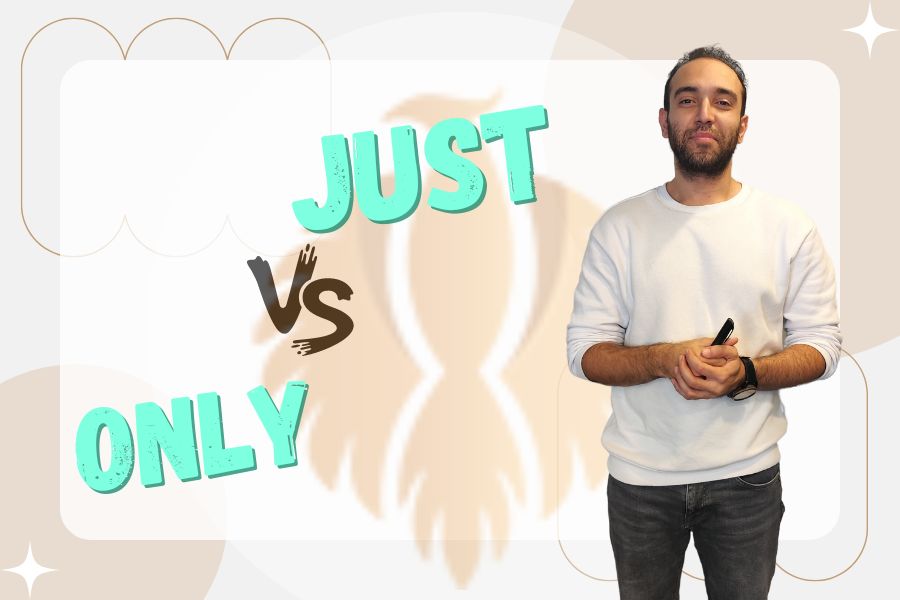Hi everyone! Hope you’re enjoying learning English online! Today, I’m are going to tell you all you need to know about the differences between the use of “only” and “just”.
As you know, these two words sometimes have a similar meaning, but not in all situations. In some contexts, we cannot use them interchangeably.
In the following section, we take a look at their definitions in dictionary. Each of these words have a few different meanings and even different parts of speech.
So, let’s investigate the different parts of speech of each word together with their meanings and examples.
Don’t miss our new video about Only Vs Just- All You Need to Know + Examples – watch now!
Definitions and Examples
First, we investigate the different meanings of “only”.
“Only” Meanings and Definitions
“Only” as an Adjective
“Only” as an “adjective” is used to show that there is a single one or very few of something, or that there are no others.
Examples:
I was the only person on the train.
Is this really the only way to do it?
The only thing that matters is that the baby is healthy.
It was the only thing I could do under the circumstances.
Rita was the only person to complain.
The only time I have clear next week is Tuesday afternoon.
The rebels’ only form of defense against the soldiers’ guns was sticks and stones.
An Olympic gold medal is the only thing that has evaded her in her remarkable career.
Dennis White scored the only goal in an otherwise forgettable match.
They turned their noses up at the only hotel that was available.
Learn English for free and have fun with me!: I Have No Clue [Meaning + Examples]- All You Need To Know!
“Only” as an Adverb
“Only” as an “adverb” is used to show that something is limited to not more than, or is not anything other than, the people, things, amount, or activity stated.
Examples:
At present these televisions are only available in Japan.
Only Sue and Mark bothered to turn up for the meeting.
This club is for members only.
Only an idiot would do that.
These shoes only cost $50.
Don’t worry – it’s only a scratch.
I was only joking.
I was only trying to help.
I only arrived half an hour ago.
She spoke to me only a few minutes ago on the phone.
It’s only four o’clock and it’s already getting dark.
“Who’s there?” “It’s only me (= it is not someone you should worry about). I’ve locked myself out.”
It’s only natural that you should worry about your children.
Other uses of the word “only”

1- “Only” is also used when saying that something unpleasant will happen as a result of an action or a failure to act.
Example:
If you don’t do something about it now, it will only get worse.
2- “Only” is also used before “hope” and “wish” to emphasize what you are hoping or wishing for.
Examples:
I only hope you know what you’re doing.
I only wish that they would keep in touch more regularly.
I’d love to go to Australia. I only wish I could afford to.
3- “Only” can also be used to show that you think someone has done something silly.
Example:
She’s only locked herself out of her flat again!
Note: In spoken English, the combination of “only just” is used to emphasize
something. It can mean “very recently” or “almost not”.
Examples:
She’d only just moved into her new house last July. (very recently)
The building had survived the earthquake of two years before, but only just. (It almost didn’t survive the earthquake.)
Learn English for free and have fun with me!: As Busy as a One-Armed Paper Hanger + Examples
Important notes about the position of “only” in sentences
As an adjective, we use “only” in front of a noun or “one”, or before another adjective or a number.
Examples:
Is that your only copy of the book?
He was the only one who could read in the village.
That was the only large t-shirt left in that color.
There were only four United fans in the room.
We can use “only” as an adverb in different positions, depending on its focus. If the subject is the focus, we put “only” in front position.
Examples:
Only Jason knows where the key is kept.
Only a very small bed will fit in this room.
If the focus is on another part of the sentence, we usually put “only” in the normal mid position for adverbs (between the subject and the main verb, or after the modal verb or first auxiliary verb, or after “be” as a main verb).
Examples:
I only go home once a month. (between subject and main verb)
She had only arrived at midnight the night before. (after the first auxiliary verb)
She’s only sixteen. (after “be” as a main verb)
If the focus is a whole clause, we can put “only” in front position.
Example:
My arm hurts but only when I try to raise it.
“Just” Meanings and Definitions
Now, let’s look at the different meanings of “just”. “Just” is an “adverb” and has different meanings and usages. Each meaning is explained below together with a few sample sentences.
“Just” as an Adverb 1
Just (adverb)
Meaning: now or (almost) at the same time, or very soon, or very recently
Examples:
“Where are you, Jim?” “I’m just coming.”
I’ll just finish this, then we can go.
He’d just got into the bath when the phone rang.
The children arrived at school just as (= at the same moment as) the bell was ringing.
The doctor will be with you in just a minute/moment/second (= very soon).
It’s just after/past (UK also gone) ten o’clock.
He just left – if you run, you can catch him.
It was just past (= very soon after) midnight.
We got the children off to school just as the bus was about to leave.
We’re just about to begin (= We will begin very soon).
The doctor will see you in just a minute/moment/second (= very soon).
“Just” as an Adverb 2
Just (adverb)
Meaning: exactly or equally
Examples:
This carpet would be just right for the dining room.
The twins look just like each other.
Things turned out just as I expected.
You’ve got just as many toys as your brother.
Thank you, it’s just what I’ve always wanted.
I can’t help you just now/yet.
Just then, the lights went out.
I can just imagine Sophie as a police officer.
Luckily, he had just the right amount of money with him.
This paint is just the right color for my kitchen.
He always knows just the right thing to say.
It was just the right weather for a marathon.
I’m just as upset about it as you are.
Beth looks just like her mother.
It was just what I expected.
“just” as an Adverb 3
Just (adverb)
Meaning: only; simply
Examples:
His first pay cheque was just fifty pounds.
I’ll just check my e-mail, then we can go for coffee.
I just called to wish you a happy birthday.
We’ll just have to wait and see what happens.
“Would you like another drink?” “OK, just one more.”
It was just a joke.
His daughter’s just a baby/just a few weeks old.
We’ll just have to (= the only thing we can do is) wait and see what happens.
She lives just down the road (= very near).
Just because you’re older than me doesn’t mean you can tell me what to do.
Note: As you see, “just” in this meaning is similar to “only”. In this meaning, the two words can be used interchangeably.
“Just” as an Adverb 4
Just (adverb)
Meaning: almost not or almost
Examples:
We arrived at the airport just in time to catch the plane.
This dress (only) just fits.
“Can you see the stage?” “Yes, only just/just about.”
I’ve just about finished painting the living room.
“Just” as an adverb 5
Just (adverb)
Meaning: very; completely
Examples:
It’s just dreadful what happened to her.
Don’t you just adore lying in a hot bath?
Our holiday was just perfect.
Learn English for free and have fun with me!: Ride the Tide [Definition + Examples]
Other uses of the word “just”

The use of “just” in sentences is not limited to the cases that were mentioned above. It has other usages that we learn here as well.
1- “Just” can be used to make a statement or order stronger.
Examples:
He just won’t do as he’s told.
It’s just too expensive.
Just shut the door quickly or we’re going to be late.
2- “Just” can also be used to reduce the force of a statement and to suggest that it is not very important.
Examples:
Can I just borrow the scissors for a second?
I just wanted to ask you if you’re free this afternoon.
Could you just open the window?
I was just wondering if I could speak to you about Anna?
Note: There is a common adverb of time “just now”, which is used to refer to “a very short time ago”
Example:
Gabrielle’s fine – I spoke to her just now.
Or to refer to “the present time”.
Example:
I’m not ready to talk about it just now.
Learn English for free and have fun with me!: No Earlier Than – All You Need To Know [Meaning + Examples]
Concluding Note
Today I taught you all you need to know about the differences between “only” and “just”.
I told you about their various meanings and usages as well as their parts of speech.
To sum up the main points here, “just” can mean “recently”, “only”, “exactly”, “simply” and “absolutely” in different contexts.
To understand its meaning in each context, I encourage you to read more and more, since reading enhances understanding of context. As for “only”, it has two parts of speech; it can be used as an adverb or as an adjective.
As an adverb, it refers to the limits of something and as an adjective, it refers to the number of things or people. I hope this lesson would be fruitful to you.
Don’t forget to visit my page again for more interesting English lessons!

Hi, welcome to my blog! My name is Omid and I am thrilled to have you here! I am an English language teacher with 12 years of experience and hold multiple international certifications (TESOL, IELTS, TOEFL, PTE, CELTA). Additionally, I hold a PhD in Applied Linguistics with a specialization in Teaching English as a Second Language (TESL), which fuels my passion for teaching English and assisting others in mastering the language. To me, nothing is more rewarding than helping individuals enhance their English language abilities through various methods. So, let’s embark on this journey of learning English together.




